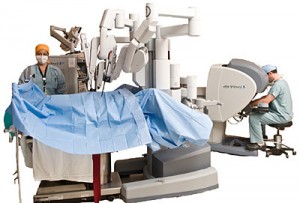
Surgical Options for Patients with Colorectal Cancer
-
Physicians at Fox Chase Cancer Center are recognized experts in minimally invasive colorectal surgery, including laparoscopy, single-incision laparoscopy and da Vinci® robotic-assisted surgery.
Unfortunately, the vast majority of colorectal surgery performed in the United States is still performed with traditional or standard open incisions despite the availability of these less invasive techniques.
What are the Benefits of Minimally Invasive Surgery?
As a surgical oncologist who performs a large volume of colorectal surgery, I feel there are benefits to minimally invasive techniques for resection. These techniques are offered to the majority of patients that I see in my practice for initial resection of their tumor. The main benefit to patients is a shorter inpatient hospital stay, decreased postoperative pain, and the cosmetic benefits of smaller abdominal incisions. The operations can be performed in the same amount of time as the standard open approaches and studies have demonstrated that they are the same from an oncologic standpoint.
The Laparoscopic Approach
For standard laparoscopic colorectal surgery, the patients generally have 2 to 3 small incisions, about a centimeter in size, and one larger incision, generally near the belly button which is used to remove the specimen. This incision is usually 4-5 centimeters in length. Single-incision laparoscopy involves just one tiny incision at the belly button. For laparoscopic resections, I hold the instruments at the operating room table. I discuss the need for stomas with my patients at length before the procedure. I do everything possible not to perform permanent colostomies unless absolutely necessary.

Robotic-Assisted SurgeryFor da Vinci® robotic-assisted colorectal surgery, there are generally 4 small incisions and one larger incision to remove the specimen. The main difference when using the robot is that the robotic arms hold the instruments and I control the robot from a console. The robotic instruments provide increased dexterity, with increased degree of motion and articulation over standard laparoscopic instruments. The technique is ideal in the low pelvis, and I generally use the robot for rectal cancer patients.
Which Option is Best for You?
If you have been diagnosed with colorectal cancer, be sure to ask your physician about minimally invasive treatment options. I would recommend a minimally invasive approach to removing colorectal cancer if the patient was my own family member.
If you have any questions, you can email them to me at [email protected].
Dr. Jeffrey Farma
Attending Surgeon
Fox Chase Cancer Center
